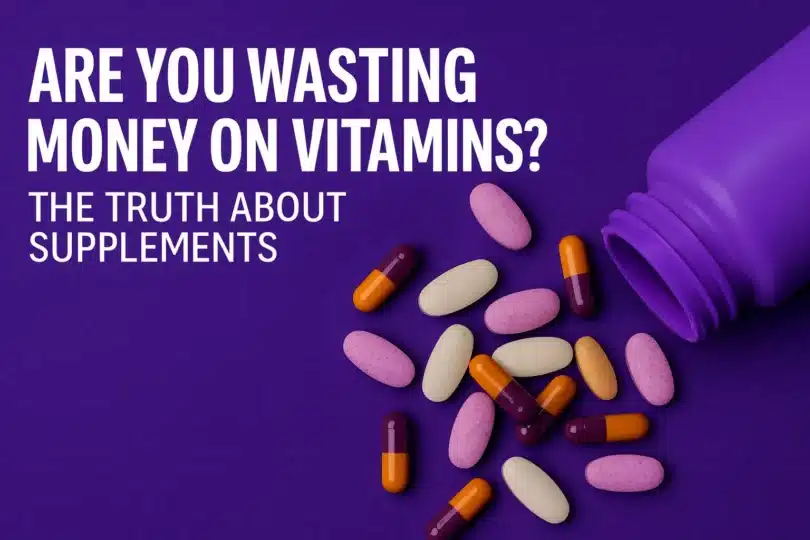Vitamins and supplements have become a cultural habit. A bottle for energy, another for sleep, one more for “immune support.” They fill shelves, promise vitality, and represent control in a world that often feels unhealthy.
But behind the glossy labels, studies increasingly show a simple truth: most supplements don’t work — at least not the way we think they do.
A comprehensive review from Verywell Health highlights that multivitamins do not reduce disease risk or improve lifespan in healthy people. And some supplements, such as beta-carotene and vitamin E, can even cause harm when taken in high doses or by the wrong groups.
Still, not all supplements are useless. Some, like vitamin D and folic acid, play critical roles for specific needs. The key is knowing the difference — and understanding that real nutrition comes from food, not pills.
The Billion-Dollar Belief
Globally, the supplement industry is worth more than $150 billion — a number expected to double in the next decade. Marketing fuels this growth with messages that tap into anxiety: “boost immunity,” “detox naturally,” “protect your heart.”
But the science behind these claims is often underwhelming. The U.S. Preventive Services Task Force has repeatedly found no strong evidence that taking vitamin or mineral supplements reduces the risk of chronic diseases in otherwise healthy adults.
Why? Because supplements don’t behave like food. Nutrients in isolation don’t always produce the same benefits as when they’re consumed in a natural matrix of fiber, fat, and co-factors.
Even well-meaning supplementation can backfire. For example, high doses of fat-soluble vitamins like A, D, E, and K can accumulate in the body and cause toxicity. Beta-carotene, once sold as a cancer-preventing antioxidant, actually increased lung cancer risk in smokers.
Supplements are not inherently evil — but the idea that they’re universally beneficial is more marketing than medicine.
When Pills Turn Problematic
Beyond being ineffective for prevention, supplements carry hidden risks. Because they are regulated as food — not drugs — the FDA does not verify safety or efficacy before they reach the market.
That means what’s inside your supplement bottle may not match the label. Independent testing has repeatedly found contamination, inaccurate doses, and even traces of heavy metals in some popular brands.
Interactions are another danger.
- St. John’s Wort, marketed for mood, can reduce the effectiveness of birth control and antidepressants.
- Vitamin E can thin the blood, increasing bleeding risk when combined with anticoagulants.
- Herbal blends may impact liver enzymes that metabolize prescription drugs.
In short, “natural” doesn’t mean safe. The real problem is that most consumers treat supplements as harmless add-ons — when in reality, they can subtly disrupt the body’s chemistry or medical treatments.
The Few Vitamins and Supplements That Matter
Not all supplements are snake oil. Some have strong scientific backing — just not for everyone.
- Folic acid: essential for preventing neural tube defects during pregnancy.
- Vitamin D: crucial for people who lack sunlight or have absorption issues.
- Vitamin B12: important for vegans, vegetarians, and older adults who absorb less from food.
- Iron: for menstruating women, pregnant individuals, and those with anemia.
These examples share a pattern: targeted supplementation for specific, proven deficiencies. It’s not about more — it’s about precision.
Doctors increasingly recommend testing before supplementing. A simple blood test can determine whether your fatigue is caused by low iron, low D, or just lack of sleep. The smarter path is evidence-driven, not influencer-driven.
Food: The Original Supplement
Whole foods remain the gold standard for nutrition. Nature packages vitamins alongside fiber, enzymes, and phytonutrients that enhance absorption and regulate balance — something no capsule can replicate.
Consider an orange. It delivers vitamin C, yes — but also flavonoids and fibers that slow sugar absorption and reduce inflammation. Taking vitamin C alone won’t provide that synergy.
A balanced diet rich in colorful vegetables, whole grains, healthy fats, and quality proteins offers all the nutritional complexity your body needs. Supplements can fill small gaps but cannot rebuild what poor diet and lifestyle neglect.
As one Harvard researcher put it, “You can’t supplement your way out of bad habits.”
How to Use Supplements Wisely
If you do choose to use vitamins and supplement, be intentional:
- Test before you guess. Get bloodwork.
- Target deficiencies. Don’t megadose.
- Check interactions. Especially if taking medications.
- Choose quality. Look for NSF or USP-certified brands.
- Reassess regularly. What you need at 35 may differ at 55.
Supplements should complement — not replace — a healthy lifestyle.
Vitamins and Supplements – Conclusion
Are you wasting your money on vitamins and supplements? For most people, yes. But not because supplements are scams — because we expect them to do too much.
Vitamins and supplements can’t replace the nutrition of a real meal, the healing of good sleep, or the benefits of movement. Supplements have a place, but it’s small, specific, and should always be backed by testing and professional guidance.
The truth is simple: health doesn’t come in a pill. It comes from daily choices — and from treating your body like the ecosystem it is, not a vending machine for quick fixes.
This article is for educational and informational purposes only. It is not medical advice and should not replace consultation with a qualified healthcare provider. Always speak with your doctor or pharmacist before starting, changing, or stopping any supplement or medication.

